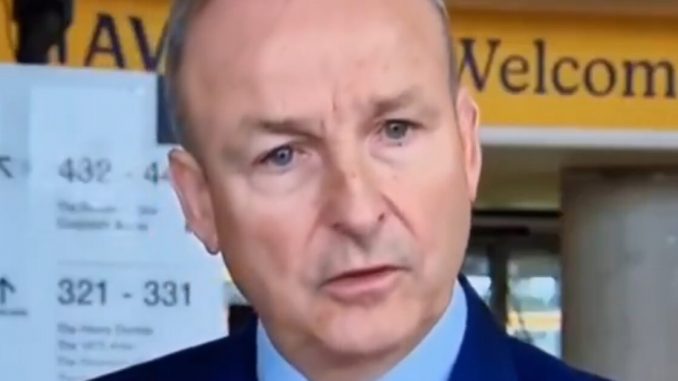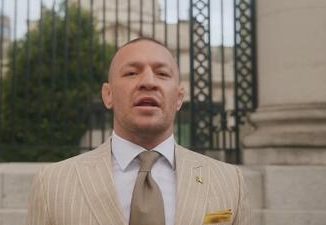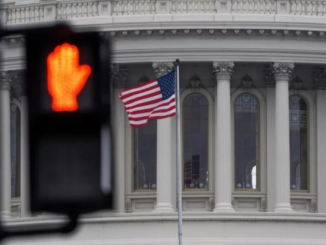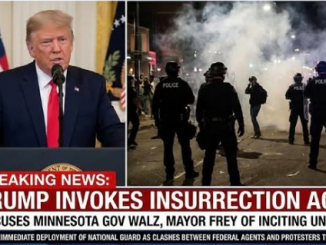
Irish Prime MInister Michael Martin
Published September 12, 2025
Ireland’s Taoiseach (Prime Minister) Micheál Martin has declared that the phrase “Ireland for the Irish” constitutes an incitement to violence, emphasizing the need for a strategic response to rising acts of exclusion and violence in the country.
Speaking at a press conference, Martin expressed concern over a growing narrative in Ireland that seeks to marginalize individuals based on their race, creed, or nationality. He stated that such rhetoric undermines societal cohesion and the dignity of all individuals born in the country.
Martin’s remarks come amid rising public discontent over mass immigration and the government’s immigration policies. Protests have erupted across the country, with demonstrators voicing opposition to the government’s stance on immigration and border control. Critics argue that Martin’s comments reflect a broader agenda to suppress nationalist sentiments and enforce stricter hate speech laws.
The debate has intensified as Ireland grapples with balancing national identity, social cohesion, and the challenges posed by immigration. While some view Martin’s position as a necessary stand against divisive rhetoric, others perceive it as an infringement on free expression and a move towards authoritarian governance. The situation remains fluid, with ongoing discussions about the future direction of Irish society.
 Implications of Ireland’s Prime Minister Micheál Martin declaring the phrase “Ireland for the Irish” as an incitement to violence:
Implications of Ireland’s Prime Minister Micheál Martin declaring the phrase “Ireland for the Irish” as an incitement to violence:
1. Social Implications
-
Polarization of Society: The declaration could deepen divides between nationalist groups and those advocating for multiculturalism. Supporters of the phrase may feel marginalized or censored, potentially leading to protests or social unrest.
-
Immigrant Integration: By labeling nationalist rhetoric as violent, the government may aim to protect immigrant communities, signaling a strong stance against discrimination. This could encourage safer integration but may also trigger backlash among native citizens who feel their identity is under threat.
2. Political Implications
-
Free Speech Debates: Critics may argue this move threatens freedom of expression. Political opponents could use the decision to frame the government as authoritarian or overreaching.
-
Policy Shifts: The government may introduce stricter hate speech laws or enforcement mechanisms, affecting how public discourse is conducted in Ireland.
-
Electoral Repercussions: Nationalist or anti-immigration parties may gain support as citizens react to perceived suppression, influencing upcoming elections or local governance.
3. Economic Implications
-
Investor Perception: Social tension and political debates can affect Ireland’s image as a stable investment destination. Businesses may be cautious if protests or unrest escalate.
-
Labor Market Effects: Immigration policies intertwined with social cohesion debates could influence labor supply, particularly in sectors dependent on foreign workers.
4. International Implications
-
EU Relations: As a member of the EU, Ireland’s stance against nationalist rhetoric may align with broader EU commitments to human rights and anti-discrimination policies.
-
Diplomatic Messaging: Ireland may be signaling its position globally as a tolerant, multicultural society, affecting tourism, foreign relations, and soft power.
5. Long-Term Societal Implications
-
National Identity Debate: This could spark a deeper national conversation on what it means to be “Irish” in a modern, globalized society.
-
Potential Backlash: If nationalist voices feel suppressed, it could lead to underground movements or radicalization, posing a long-term security concern.
 Overall Takeaway:
Overall Takeaway:
Ireland’s Prime Minister Micheál Martin’s declaration that the phrase “Ireland for the Irish” constitutes an incitement to violence highlights the country’s ongoing struggle to balance national identity with social cohesion in an increasingly multicultural society. While the move aims to protect immigrant communities and counter divisive rhetoric, it risks inflaming political tensions, sparking debates over free speech, and deepening societal polarization. The coming months will reveal whether this stance fosters a more inclusive Ireland or fuels further contention over the nation’s cultural and political direction.
SOURCES: THE GATEWAY PUNDIT – Ireland’s Prime Minister Declares ‘Ireland For The Irish’ an Incitement to Violence (VIDEO)
THE IRISH EXAMINER – Taoiseach calls for ‘strategic response’ to rising acts of racism and discrimination
THE JOURNAL – Taoiseach: ‘Young people are afraid now as they are being targeted because of their ethnicity’





Be the first to comment